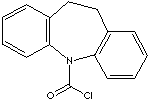PRODUCT IDENTIFICATION

H.S. CODE
TOXICITY
CLASSIFICATION
PHYSICAL AND CHEMICAL PROPERTIES
REFRACTIVE INDEX
Stable under ordinary conditions.
GENERAL DESCRIPTION & APPLICATIONS
Iminodibenzyl structure, a tricyclic tertiary amine, is related to a class of anticonvulsants which are employed in the prevention or the treatment of epileptic seizures and bipolar disorders. Iminodibenzyl is used as an intermediate for the synthesis of specific analgesic and antipsychotic agents. is used as an intermediate for the synthesis of specific analgesic and antipsychotic agents. An example of the target compound is carbamazepine.
APPEARANCE
PURITY
98.0% min